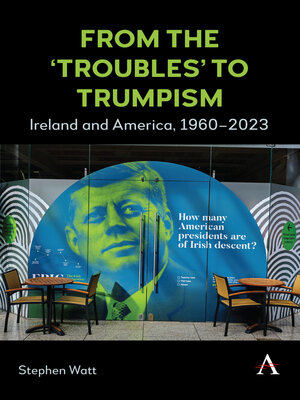
Sign up to save your library
With an OverDrive account, you can save your favorite libraries for at-a-glance information about availability. Find out more about OverDrive accounts.
Find this title in Libby, the library reading app by OverDrive.



Search for a digital library with this title
Title found at these libraries:
| Library Name | Distance |
|---|---|
| Loading... |
In Shakespeare Our Contemporary (1964), Polish critic Jan Kott defines one purpose of scholarship in the humanities that summarises the chief aim of this project: 'The writing of history and, above all, literary criticism can, and must, always be understood as an attempt to find in the past aspects of human experience that can shed light on the meaning of our own times'. That is precisely what From the 'Troubles' to Trumpism: Ireland and America, 1960–2023 attempts to do. Aided by the insights of Irish and Northern Irish playwrights, poets and novelists, this book uses America's historical relationship with Ireland and Northern Ireland as a means of understanding the rise of Trumpism and assessing its potential to incite a new American 'Troubles'. Three related aims are to demonstrate the interdependence of Ireland and the United States since the Famine in Ireland and the American Civil War in the nineteenth century; to delineate the political and economic obstacles in the latter decades of the last century that prevented this relationship from evolving into a more consequential partnership; and to identify the underappreciated leaders who played crucial roles in both the brokering of the Good Friday Agreement and the inception of a revised foreign policy.
|The essays in this book attempt to follow Jan Kott's counsel by combining historical investigation with cultural criticism to illuminate the present moment, particularly the present American moment. In this regard, the dates 1960 and 1923 in the book's subtitle are by no means accidental. The first three chapters concern the history of America's relationship with Ireland during the administrations of the presidents whose terms spanned the immediate pre-history and history of the Troubles. After a glance backward at American and Irish relations in the nineteenth century, the first chapter focuses on the 1960 election of John F. Kennedy, the first Catholic president in America's history and the first to visit Ireland during his term of office. It also juxtaposes Kennedy's jubilant 1963 trip to Ireland with Ronald Reagan's more complicated homecoming in 1984. The next two chapters examine relationships between Ireland, Northern Ireland and the United States from the time of the Kennedy assassination through the administrations of Richard Nixon, Gerald Ford, Jimmy Carter, Ronald Reagan and Bill Clinton, who in 1995 became the first American president to visit Northern Ireland during his presidency. The fourth chapter begins by juxtaposing the literacy and urbanity of presidents like Joe Biden and Michael D. Higgins of Ireland with the aversion to reading of President Biden's predecessor, suggesting the advisability of electing readers as national leaders. This discussion includes the Democratic party primary before Biden's 2020 election, the implications of his allusions to Seamus Heaney's The Cure at Troy during his campaign and his trip to Ireland in 2023 to commemorate the 25th anniversary of the Good Friday Agreement.
Between these chapters, shorter editorials or 'provocations' appear that consider analogies between a Northern Irish past and an uncertain American future, the latter of which is reprised in the book's conclusion. This structural device, commonly called the 'interchapter', is hardly original as both creative and scholarly writers have employed it to offer supplements to matters relevant to their larger projects. In his short story collection Walking the Dog (1994), for example, Bernard MacLaverty combines nine stories with ten vignettes,...







